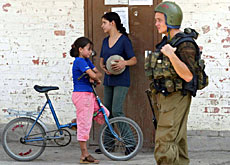NGOs slam UN human rights body for going soft

Swiss and international non-governmental organisations (NGOs) have called on the United Nations' top human rights body to reform itself or risk becoming irrelevant.
The comments came ahead of the 60th annual session of the UN Human Rights Commission (UNHRC), which opened in Geneva on Monday.
“Time and time again, the Commission has turned a blind eye to human rights violations and allowed perpetrators to operate with impunity,” said the secretary-general of Amnesty International, Irene Khan.
“And if it is not willing to confront the major human rights challenges of the world, it will be sidelined,” she told swissinfo.
Adrien-Claude Zoller of the Swiss NGO, Geneva for Human Rights, agrees that the UN body – which is charged with upholding and denouncing human rights violations – has lost sight of its mandate.
“The Commission has become a chamber of impunity, with the judges and the accused sitting on the same bench,” Zoller told swissinfo.
Impunity
At a recent debate hosted by swissinfo, the Libyan president of last year’s session, Najat Al-Hajjaji, flatly rejected Zoller’s statement, saying the UNHRC was not a “forum for impunity”.
But Zoller worries that suggestions put forward by developing countries to move away from “naming and shaming” countries – in favour of a slap on the wrist and more technical and cooperative assistance – could weaken the Commission’s position.
“Condemnation is a must when massive human rights abuses have been committed… Without it, the Commission will no longer have a raison d’être,” Zoller said.
“It’s ridiculous that members of the Commission might even consider no longer adopting resolutions on countries,” he added. “The only way for them to uphold their mandate is to denounce violations, while at the same time providing support.”
Torture
Over the next six weeks, the UNHRC is expected to consider the human rights situation in some 20 countries, and at the same time address a range of issues, including rights to development and education, torture and the sale of children.
But NGOs, like Amnesty and Human Rights Watch, have challenged the Commission to go a step further by tackling thornier subjects such as the status of American-held prisoners in Guantanamo Bay, the US-led war on terror and sexual orientation.
They’re also pushing for debate on the human rights record of several individual countries.
“When you look around the world, you see a battering of human rights in Iraq, Afghanistan, Congo, China, Chechnya, Zimbabwe, Sudan, Saudi Arabia and now Haiti,” Khan told swissinfo. “And where is the Commission in all of this?”
For his part, Zoller said he hoped there would be follow-up discussions on countries such as Belarus, Turkmenistan and North Korea, which were the subject of resolutions last year.
Counter-terrorism
NGOs are also pushing for the Commission to appoint an advisor to monitor the effects of anti-terrorism measures on human rights.
The United States, Great Britain, Spain and Australia, which is leading this year’s session, are against such a proposal, as are India, Pakistan and Saudi Arabia.
But Amnesty and Human Rights Watch say the US-led war on terror has resulted in numerous human rights abuses and they are calling on the UN to take action.
“We have been struggling for the past few years to get the Commission to establish a special mechanism to deal with this issue,” Khan told swissinfo.
“Since September 11, we have seen human rights come under attack by governments in the name of counter-terrorism and we believe the Commission has to play a role here,” she added.
Women
Other issues NGOs are urging the Commission to examine are violence against women and discrimination against homosexuals.
Ten years ago, the Commission established a UN special rapporteur, or advisor, on violence against women, but Khan says widespread violations still occur.
“A decade after the Vienna Conference endorsed women’s rights as human rights, one in three women in the world continues to suffer serious abuse, attack, rape or coerced sex,” she said. “This is an outrageous scandal.”
Besides women’s rights, Zoller says the UNHRC’s other main priority should be the adoption of a resolution on sexual orientation.
“This would allow sexual minorities to finally, after so many decades, be recognised as human beings,” he said.
swissinfo, Anna Nelson in Geneva
The Commission on Human Rights meets every year in Geneva over six weeks.
It assigns working groups, individual experts, representatives and “rapporteurs” with mandates to monitor specific issues.
The UN body is made up of 53 rotating member states, which are elected by the UN’s Economic and Social Council.
Over 3,000 delegates from member and observer states, along with non-governmental organizations, participate each year.
Switzerland is not a member of the UNHRC but there is a motion before parliament to put forward the country’s candidacy to join, most likely in 2007.

In compliance with the JTI standards
More: SWI swissinfo.ch certified by the Journalism Trust Initiative

You can find an overview of ongoing debates with our journalists here . Please join us!
If you want to start a conversation about a topic raised in this article or want to report factual errors, email us at english@swissinfo.ch.